转自https://blog.csdn.net/sanyaoxu_2/article/details/80555328
1:认识Swagger
Swagger 是一个规范和完整的框架,用于生成、描述、调用和可视化 RESTful 风格的 Web 服务。总体目标是使客户端和文件系统作为服务器以同样的速度来更新。文件的方法,参数和模型紧密集成到服务器端的代码,允许API来始终保持同步。
作用:
1. 接口的文档在线自动生成。
2. 功能测试。
Swagger是一组开源项目,其中主要要项目如下:
1. Swagger-tools:提供各种与Swagger进行集成和交互的工具。例如模式检验、Swagger 1.2文档转换成Swagger 2.0文档等功能。
2. Swagger-core: 用于Java/Scala的的Swagger实现。与JAX-RS(Jersey、Resteasy、CXF...)、Servlets和Play框架进行集成。
3. Swagger-js: 用于JavaScript的Swagger实现。
4. Swagger-node-express: Swagger模块,用于node.js的Express web应用框架。
5. Swagger-ui:一个无依赖的HTML、JS和CSS集合,可以为Swagger兼容API动态生成优雅文档。
6. Swagger-codegen:一个模板驱动引擎,通过分析用户Swagger资源声明以各种语言生成客户端代码。
2:Maven
版本号请根据实际情况自行更改。
<dependency>
<groupId>io.springfox</groupId>
<artifactId>springfox-swagger2</artifactId>
<version>2.2.2</version>
</dependency>
<dependency>
<groupId>io.springfox</groupId>
<artifactId>springfox-swagger-ui</artifactId>
<version>2.2.2</version>
</dependency>
3:创建Swagger2配置类
在Application.java同级创建Swagger2的配置类Swagger2
-
package com.swaggerTest;
-
-
import org.springframework.context.annotation.Bean;
-
import org.springframework.context.annotation.Configuration;
-
-
import springfox.documentation.builders.ApiInfoBuilder;
-
import springfox.documentation.builders.PathSelectors;
-
import springfox.documentation.builders.RequestHandlerSelectors;
-
import springfox.documentation.service.ApiInfo;
-
import springfox.documentation.spi.DocumentationType;
-
import springfox.documentation.spring.web.plugins.Docket;
-
import springfox.documentation.swagger2.annotations.EnableSwagger2;
-
-
/**
-
* Swagger2配置类
-
* 在与spring boot集成时,放在与Application.java同级的目录下。
-
* 通过@Configuration注解,让Spring来加载该类配置。
-
* 再通过@EnableSwagger2注解来启用Swagger2。
-
*/
-
-
-
public class Swagger2 {
-
-
/**
-
* 创建API应用
-
* apiInfo() 增加API相关信息
-
* 通过select()函数返回一个ApiSelectorBuilder实例,用来控制哪些接口暴露给Swagger来展现,
-
* 本例采用指定扫描的包路径来定义指定要建立API的目录。
-
*
-
* @return
-
*/
-
-
public Docket createRestApi() {
-
return new Docket(DocumentationType.SWAGGER_2)
-
.apiInfo(apiInfo())
-
.select()
-
.apis(RequestHandlerSelectors.basePackage("com.swaggerTest.controller"))
-
.paths(PathSelectors.any())
-
.build();
-
}
-
-
/**
-
* 创建该API的基本信息(这些基本信息会展现在文档页面中)
-
* 访问地址:http://项目实际地址/swagger-ui.html
-
* @return
-
*/
-
private ApiInfo apiInfo() {
-
return new ApiInfoBuilder()
-
.title("Spring Boot中使用Swagger2构建RESTful APIs")
-
.description("更多请关注http://www.baidu.com")
-
.termsOfServiceUrl("http://www.baidu.com")
-
.contact("sunf")
-
.version("1.0")
-
.build();
-
}
-
}
如上代码所示,通过createRestApi函数创建Docket的Bean之后,apiInfo()用来创建该Api的基本信息(这些基本信息会展现在文档页面中)。
4:添加文档内容
在完成了上述配置后,其实已经可以生产文档内容,但是这样的文档主要针对请求本身,描述的主要来源是函数的命名,对用户并不友好,我们通常需要自己增加一些说明来丰富文档内容。
Swagger使用的注解及其说明:
@Api:用在类上,说明该类的作用。
@ApiOperation:注解来给API增加方法说明。
@ApiImplicitParams : 用在方法上包含一组参数说明。
@ApiImplicitParam:用来注解来给方法入参增加说明。
@ApiResponses:用于表示一组响应
@ApiResponse:用在@ApiResponses中,一般用于表达一个错误的响应信息
l code:数字,例如400
l message:信息,例如"请求参数没填好"
l response:抛出异常的类
@ApiModel:描述一个Model的信息(一般用在请求参数无法使用@ApiImplicitParam注解进行描述的时候)
l @ApiModelProperty:描述一个model的属性
注意:@ApiImplicitParam的参数说明:
|
paramType:指定参数放在哪个地方 |
header:请求参数放置于Request Header,使用@RequestHeader获取 query:请求参数放置于请求地址,使用@RequestParam获取 path:(用于restful接口)-->请求参数的获取:@PathVariable body:(不常用) form(不常用) |
|
name:参数名 |
|
|
dataType:参数类型 |
|
|
required:参数是否必须传 |
true | false |
|
value:说明参数的意思 |
|
|
defaultValue:参数的默认值 |
例子:
-
package com.swaggerTest.controller;
-
-
import org.springframework.stereotype.Controller;
-
import org.springframework.util.StringUtils;
-
import org.springframework.web.bind.annotation.RequestMapping;
-
import org.springframework.web.bind.annotation.RequestMethod;
-
import org.springframework.web.bind.annotation.RequestParam;
-
import org.springframework.web.bind.annotation.ResponseBody;
-
-
import io.swagger.annotations.Api;
-
import io.swagger.annotations.ApiImplicitParam;
-
import io.swagger.annotations.ApiImplicitParams;
-
import io.swagger.annotations.ApiOperation;
-
-
/**
-
* 一个用来测试swagger注解的控制器
-
* 注意@ApiImplicitParam的使用会影响程序运行,如果使用不当可能造成控制器收不到消息
-
*
-
* @author SUNF
-
*/
-
-
-
-
public class SayController {
-
-
-
-
-
-
public String getUserName(@RequestParam Integer userNumber){
-
if(userNumber == 1){
-
return "张三丰";
-
}
-
else if(userNumber == 2){
-
return "慕容复";
-
}
-
else{
-
return "未知";
-
}
-
}
-
-
-
-
-
-
-
-
-
})
-
public String updatePassword(@RequestParam(value="userId") Integer userId, @RequestParam(value="password") String password,
-
@RequestParam(value="newPassword") String newPassword){
-
if(userId <= 0 || userId > 2){
-
return "未知的用户";
-
}
-
if(StringUtils.isEmpty(password) || StringUtils.isEmpty(newPassword)){
-
return "密码不能为空";
-
}
-
if(password.equals(newPassword)){
-
return "新旧密码不能相同";
-
}
-
return "密码修改成功!";
-
}
-
}
完成上述代码添加上,启动Spring Boot程序,访问:http://localhost:8080/swagger-ui.html
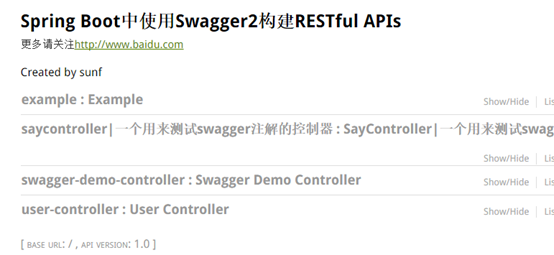
如上图,可以看到暴漏出来的控制器信息,点击进入可以看到详细信息。

两个注意点:
1. paramType会直接影响程序的运行期,如果paramType与方法参数获取使用的注解不一致,会直接影响到参数的接收。
例如:
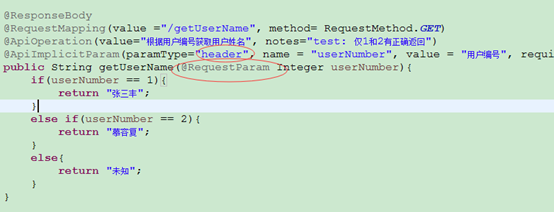
使用Sawgger UI进行测试,接收不到!
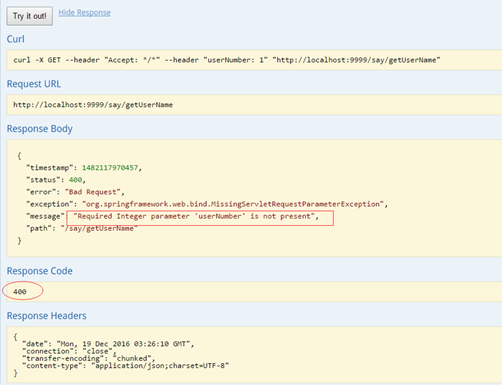
2. 还有一个需要注意的地方:
Conntroller中定义的方法必须在@RequestMapper中显示的指定RequestMethod类型,否则SawggerUi会默认为全类型皆可访问, API列表中会生成多条项目。
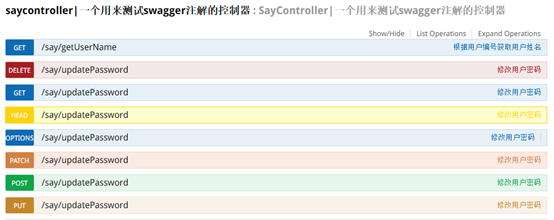
如上图:updatePassword()未指定requestMethod,结果生成了7条API信息。所以如果没有特殊需求,建议根据实际情况加上requestMethod。
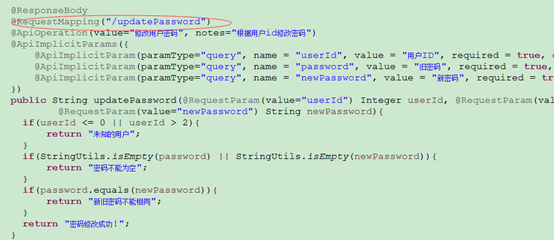
5:Swagger UI面板说明
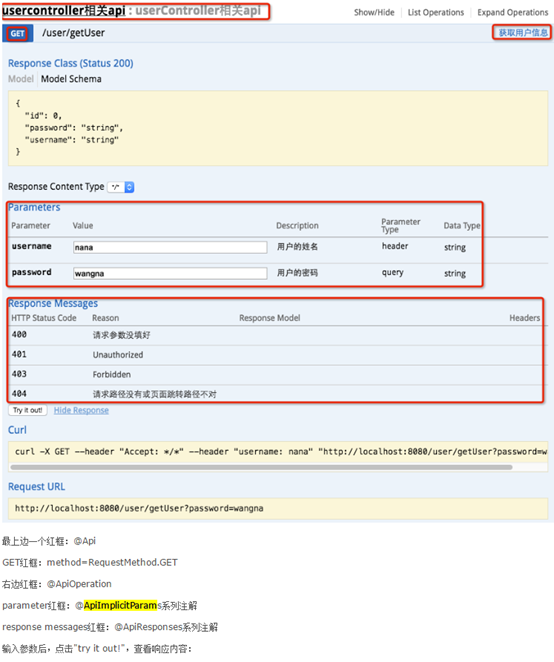
6:参考
http://blog.didispace.com/springbootswagger2/
http://blog.csdn.net/jia20003/article/details/50700736
Swagger官网 :http://swagger.io/
Spring Boot & Swagger UI : http://fruzenshtein.com/spring-boot-swagger-ui/
Github:https://github.com/swagger-api/swagger-core/wiki/Annotations
---------------------------------------------------------------------------------------
7:接收对象传参的例子
在POJO上增加
-
package com.zhongying.api.model.base; -
-
import io.swagger.annotations.ApiModel; -
import io.swagger.annotations.ApiModelProperty; -
-
/** -
* 医生对象模型,不要使用该类 -
* @author SUNF -
* -
*/ -
-
public class DemoDoctor{ -
-
private Integer id; -
-
private String name; -
-
-
public Integer getId() { -
return id; -
} -
-
public void setId(Integer id) { -
this.id = id; -
} -
-
public String getName() { -
return name; -
} -
-
public void setName(String name) { -
this.name = name; -
} -
-
-
public String toString() { -
return "DemoDoctor [id=" + id + ", name=" + name + "]"; -
} -
-
} -
注意: 在后台采用对象接收参数时,Swagger自带的工具采用的是JSON传参, 测试时需要在参数上加入@RequestBody,正常运行采用form或URL提交时候请删除。
-
package com.zhongying.api.controller.app;
-
-
import java.util.ArrayList;
-
import java.util.List;
-
-
import javax.servlet.http.HttpServletRequest;
-
-
import org.springframework.stereotype.Controller;
-
import org.springframework.web.bind.annotation.RequestBody;
-
import org.springframework.web.bind.annotation.RequestMapping;
-
import org.springframework.web.bind.annotation.RequestMethod;
-
import org.springframework.web.bind.annotation.RequestParam;
-
import org.springframework.web.bind.annotation.ResponseBody;
-
-
import com.github.pagehelper.PageInfo;
-
import com.zhongying.api.exception.HttpStatus401Exception;
-
import com.zhongying.api.model.base.DemoDoctor;
-
-
import io.swagger.annotations.Api;
-
import io.swagger.annotations.ApiImplicitParam;
-
import io.swagger.annotations.ApiImplicitParams;
-
import io.swagger.annotations.ApiOperation;
-
-
/**
-
* 医生类(模拟)
-
* @author SUNF
-
*/
-
-
-
-
public class DoctorTestController {
-
-
/**
-
* 添加医生
-
*
-
* 在使用对象封装参数进行传参时,需要在该对象添加注解,将其注册到swagger中
-
* @link com.zhongying.api.model.base.DemoDoctor
-
*
-
* 注意: 在后台采用对象接收参数时,Swagger自带的工具采用的是JSON传参,
-
* 测试时需要在参数上加入@RequestBody,正常运行采用form或URL提交时候请删除。
-
*
-
* @param doctor 医生类对象
-
* @return
-
* @throws Exception
-
*/
-
-
-
-
public String addDoctor(
-
if(null == doctor || doctor.getId() == null){
-
throw new HttpStatus401Exception("添加医生失败","DT3388","未知原因","请联系管理员");
-
}
-
try {
-
System.out.println("成功----------->"+doctor.getName());
-
} catch (Exception e) {
-
throw new HttpStatus401Exception("添加医生失败","DT3388","未知原因","请联系管理员");
-
}
-
-
return doctor.getId().toString();
-
}
-
-
/**
-
* 删除医生
-
* @param doctorId 医生ID
-
* @return
-
*/
-
-
-
-
-
public String deleteDoctor(
-
if(doctorId > 2){
-
return "删除失败";
-
}
-
return "删除成功";
-
}
-
-
/**
-
* 修改医生信息
-
* @param doctorId 医生ID
-
* @param doctor 医生信息
-
* @return
-
* @throws HttpStatus401Exception
-
*/
-
-
-
-
-
public String updateDoctor(
-
if(null == doctorId || null == doctor){
-
throw new HttpStatus401Exception("修改医生信息失败","DT3391","id不能为空","请修改");
-
}
-
if(doctorId > 5 ){
-
throw new HttpStatus401Exception("医生不存在","DT3392","错误的ID","请更换ID");
-
}
-
System.out.println(doctorId);
-
System.out.println(doctor);
-
return "修改成功";
-
}
-
-
/**
-
* 获取医生详细信息
-
* @param doctorId 医生ID
-
* @return
-
* @throws HttpStatus401Exception
-
*/
-
-
-
-
-
public DemoDoctor getDoctorDetail(
-
System.out.println(doctorId);
-
if(null == doctorId){
-
throw new HttpStatus401Exception("查看医生信息失败","DT3390","未知原因","请联系管理员");
-
}
-
if(doctorId > 3){
-
throw new HttpStatus401Exception("医生不存在","DT3392","错误的ID","请更换ID");
-
}
-
DemoDoctor doctor = new DemoDoctor();
-
doctor.setId(1);
-
doctor.setName("测试员");
-
return doctor;
-
}
-
-
/**
-
* 获取医生列表
-
* @param pageIndex 当前页数
-
* @param pageSize 每页记录数
-
* @param request
-
* @return
-
* @throws HttpStatus401Exception
-
*/
-
-
-
-
-
-
-
-
})
-
public PageInfo<DemoDoctor> getDoctorList(
-
-
HttpServletRequest request) throws HttpStatus401Exception{
-
-
String token = request.getHeader("token");
-
if(null == token){
-
throw new HttpStatus401Exception("没有权限","SS8888","没有权限","请查看操作文档");
-
}
-
if(null == pageSize){
-
throw new HttpStatus401Exception("每页记录数不粗安在","DT3399","不存在pageSize","请查看操作文档");
-
}
-
-
DemoDoctor doctor1 = new DemoDoctor();
-
doctor1.setId(1);
-
doctor1.setName("测试员1");
-
DemoDoctor doctor2 = new DemoDoctor();
-
doctor2.setId(2);
-
doctor2.setName("测试员2");
-
-
List<DemoDoctor> doctorList = new ArrayList<DemoDoctor>();
-
doctorList.add(doctor1);
-
doctorList.add(doctor2);
-
return new PageInfo<DemoDoctor>(doctorList);
-
}
-
-
-
}
增加header:
现在很多请求需要在header增加额外参数,可以参考getDoctorList()的做法,使用request接收。